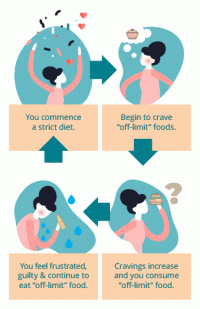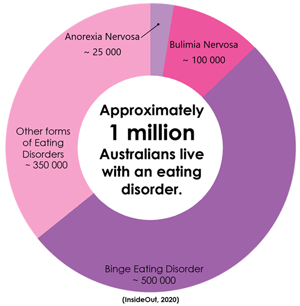Eating disorder services for Townsville & North Queensland
Our dietitians, psychologists, exercise physiologists, and social workers provide evidence-based treatment that is designed to improve your quality of life and confidence in the community.
Different Types of Eating Disorders
Below are a few common eating disorders and associated conditions:
Anorexia can affect people of all ages and is not always immediately noticeable. There are three characteristics that are identified for a diagnosis:
- Restriction of energy intake causing dramatic weight loss – below minimally normal level for age, sex, development, and physical health.
- Intense fear of gaining weight or behaviour that restricts weight gain.
- Lack of recognition of weight/shape –disturbed body image including perception of being overweight or putting extreme emphasis on appearance.
There can be physical, psychological, and behavioural signs that indicate a person may have anorexia.
- Rapid weight loss or frequent weight change
- Fainting or dizziness
- Lethargy, low energy, or disturbed sleep
- Feeling bloated, constipated, or developing intolerances to food
- Preoccupation with eating, food, body shape, and weight
- Felling anxious or irritable around meals
- Low self-esteem or perfectionism
- Increased sensitivity to comments relating to food, weight, body shape, or exercise
- Restrictive dieting behaviour
- Binge eating and compensatory behaviours
Anorexia can pose many risks if left untreated including anaemia, compromised immunity, intestinal issues, disturbed menstrual cycle for women, heart problems, and bone fragility.
A similar condition, Atypical Anorexia, presents with all the same criteria as anorexia nervosa, except despite significant weight loss, the person is still within or above the normal weight range.
Bulimia is characterised as repeated episodes of binge eating followed by compensatory methods to prevent weight gain. People with bulimia can put a lot of emphasis on their appearance and body shape which can affect their self-esteem and self-worth. The eating and binging behaviours can cause shame and guilt which leads people to hide their habits and can make it harder to diagnose or detect.
The two key factors for Bulimia are:
- Eating a large amount of food in a short period of time.
- Controlling weight following a binge by vomiting, using laxatives or over the counter drugs, fasting, or exercising excessively.
These behaviours can grow over time and become more compulsive and difficult to control. Signs and symptoms include:
- Frequent changes in weight.
- Signs of damage from vomiting – swelling around cheeks, damage to teeth, or bad breath.
- Fainting or dizziness and disturbed sleep.
- Low self-esteem and feelings of guilt or shame following mealtimes.
- Having a distorted body image or extreme body dissatisfaction.
- Evidence of binge eating.
- Frequent trips to the bathroom during or shortly after meals.
Bulimia can cause significant risks including chronic sore throat, heartburn, and reflux; inflammation and rupture of oesophagus from frequent vomiting; stomach and intestinal ulcers; and chronic bowel issues from laxative overuse.
Binge eating disorder occurs when a person feels a lack of control over their eating but do not engage in purging or compensatory behaviours to control weight. Binge eating involves:
- Eating a very large amount of food in a short period of time – within two hours.
- Feeling a sense of loss of control while eating – unable to stop yourself.
When a person binges, they can eat more rapidly than normal, eat a lot when not feeling hungry, and eat until they feel uncomfortably full. A binge is normally followed by feelings of guilt, disgust, or embarrassment.
Warning signs of binge eating disorder include:
- Feeling tired or not sleeping well.
- Feeling bloated, constipated, or developing intolerances to food.
- Extreme body dissatisfaction and shame about appearance.
- Low self-esteem or anxiety.
- Evading questions about eating or weight and sensitivity to comments relating to this.
The risks of binge eating include weight fluctuation, osteoarthritis, kidney problems, or high blood pressure/high cholesterol.
A person with Other Specified Feeding or Eating Disorders (OSFED) may present with symptoms of other eating disorders but do not meet the full criteria to be officially diagnosed. OSFED is just as serious a disorder with a majority of people seeking treatment being diagnosed with it. It can present as:
- Extremely disturbed eating habits
- Distorted body image
- Intense fear of gaining weight
Signs and Symptoms of OSFED overlap with other eating disorders and can include:
- Weight loss, gain, or fluctuations outside normal limits for age, sex, and development.
- Loss or disturbance of menstrual cycle in women, and decreased libido in men.
- Compromised immunity.
- Fainting or dizziness.
- Obsession with food and eating, including sensitivity to comments relating to this.
- Low self-esteem, shame, self-loathing, or guilt.
- Distorted body image or body dissatisfaction.
- Dieting behaviour.
- Evidence of binging.
- Repetitive behaviours around body shape, appearance, and weight.
- Increased isolation.
OSFED comes with many risks depending on the symptoms a person presents with.
Orthorexia is not currently recognised as an official eating disorder but is becoming more common and growing in recognition. Orthorexia is when a person is obsessed with healthy or ‘clean’ eating. This is only considered a problem if the person’s fixation with health eating becomes damaging to their wellbeing.
Signs and symptoms of orthorexia include:
- Compulsive checking of ingredients or nutritional labels.
- Cutting out food groups (sugar, carbs, gluten, dairy, meat products).
- An inability to eat other food that are not deemed healthy or pure.
- Interest in the health of what others eat.
- Spending hours thinking about food types being served at events and showing high levels of distress when their approved foods are not available.
Orthorexia can present the risk of malnutrition due to not accessing foods with the proper nutrition to live a healthy life.
Avoidant/Restrictive Food Intake Disorder (ARFID) is characterised as a persistent or disturbed pattern of feeding or eating that leads to a lack of nutrition or energy needs. Disturbed eating is generally due to a lack of interest in food, avoidance of sensory characteristics of food, or concern about consequences of eating.
ARFID can cause significant weight loss, significant nutritional deficiencies, and dependence on tube feeding or oral nutritional supplements. It commonly presents in children and in infancy as disturbed eating patterns or highly selective eating habits. ARFID is not associated with weight loss or body image but occurs due to food avoidance.
Signs and symptoms of ARFID include:
- Fearful of or a phobia of certain foods.
- Anxiety around food.
- Sensory sensitivity – taste, texture, smell, temperature.
- Feeling full after only a few mouthfuls.
- Lack of interest in food or skipping meals.
- Headaches, dizziness, or fainting.
- Dry skin, brittle nails, or hair loss.
- Anaemia
- Intestinal issues – constipation, bloating, or abdominal pain.
- Loss of bone strength, weakness, or fatigue.
The Unspecified Feeding/Eating Disorder (UFD) category applies when someone presents with symptoms that mirror an eating disorder and are experiencing significant social or occupational distress but do not meet the full criteria to be officially diagnosed with a disorder. It is considered unspecified when a clinician chooses not to specify the reason that the criteria are not met for a disorder, including insufficient information.

The Dieting Cycle
Diet culture in society attempts to normalise that weight, size, and appearance is valued over wellbeing. This prevents early intervention and treatment and can encourage the participation in the dieting cycle.
Awareness is key to target dieting behaviours. Knowing when you are participating in them can tell you when to seek help. Worrisome behaviours include frequent dieting, obsessive counting of calories, excessive exercising, using laxatives, skipping meals, loss of control around food, feeling guilt or shame around food, chronic weight fluctuations, and/or using food and weight to disrupt your relationships or work.
Body Image
Eating Disorders can begin as body image issues; managing what you eat can be a way to control your image and self-worth. The way you see your body is not always a correct representation of the way you actually look. Body image is formed by thoughts, feelings, attitudes, and beliefs about our bodies. When these feelings and beliefs become negative you are more likely to develop body dissatisfaction.
Body image can influence your outlook on everyday life including work, and your relationships. It can be difficult to change your mindset around this but working towards body satisfaction, acceptance, self-love, or neutrality can make you less likely to develop an eating disorder. Improving your body image will improve your self-esteem, self-acceptance, and encourage healthy behaviours.
Building a Care Team
Alliance Rehabilitation takes eating disorders and your concerns about body image seriously. Eating Disorders are treatable and manageable with the right care team. We offer a client-centred approach to therapy with your mental, social, and emotional wellbeing as our main goal. Finding the right treatment for you is an important step in your recovery which is why having a multidisciplinary approach is the best option.
We provide in depth consultations and assessments to get to the root of the problem together. Our goal-oriented therapy is customised to each individual, so you are receiving the best care for your situation and needs. We want to provide you with a safe environment for you to explore your relationship with food, eating behaviours, mental well-being, and body image.
Our dietitians, psychologists, exercise physiologists, and social workers provide evidence-based treatment that is designed to improve your quality of life and confidence in the community. When seeking treatment, you should always engage with a general practitioner as they can organise referrals, prescribe medication, and give an official diagnosis.
What to expect in an initial session?
An initial session at Alliance Rehabilitation will focus on allowing you to get to know your treating team. We want to make sure you feel safe talking to us. We will then work with you to set an outline of what you can expect from recovery treatment, work together on initial assessments, and develop an initial plan to commence your recovery.
Family, Friend, and Carer Support
Supporting someone with an eating disorder can be difficult. Encouraging someone to seek treatment is vital in helping them get better but your involvement outside of a clinical environment can make a big difference in their recovery. You can support someone getting treatment by:
- Helping them stay connected – an eating disorder can be isolating so it is important for them to participate in usual activities as much as possible.
- Encouraging them to talk about their feelings – listen without judging or interrupting, even if you do not agree with what they say.
- Including them in invitations – even if they say no, try to keep things as they were before the eating disorder.
- Discouraging negative self-talk – remind them of their achievements and progress.
- Separating the person from the illness – talk about the eating disorder as the problem, not the person.
It can be beneficial to educate yourself on eating disorders, so you do not unintentionally offend by discussing weight, food, or diets in front of them. Sometimes a person can seem healthy but still be suffering from low self-worth and have negative beliefs about themselves.
Often, seeing a psychologist or dietitian can be beneficial as they can provide you with tools and strategies to support someone as well as prevent you from feeling support fatigue or burnout. Supporting someone with an eating disorder can affect your own mental and physical health and it is important to recognise if you are struggling and seek help.
Telehealth
During the pandemic, we have introduced a telehealth service to allow people access to safe, quality healthcare. The service is available as a video or telephone call with our dietitians.
Referral Options
There are many ways for you to be referred to our facility.
How is Alliance Rehabilitation Different?
We are a community rehabilitation facility and work across multiple disciplines to provide a comprehensive and holistic team approach. Our community approach to therapy allows us to tailor a program to each individual and ensure we are meeting your goals. Our clinicians collaborate to aid in your rehabilitation, and we provide a comprehensive assessment, therapy planning, and monitoring to ensure you are experiencing the best quality of life. Our goal-oriented therapy is customised to each individual, so you are receiving the best care for your situation and needs. We want to provide you with a safe environment for you to explore your relationship with food, eating behaviours, mental well-being, and body image. Alliance Rehabilitation are here to help you live a healthier and happier life.
If you need to talk to someone now:
- Emergency 000
- Lifeline 13 11 14
- Butterfly Foundation 1800 33 4673 or visit https://butterfly.org.au/
- Inside Out – https://insideoutinstitute.org.au/
.

References
ANAD. (2024.) Eating Disorder Types & Symptoms. Retrieved from https://anad.org/eating-disorder-types-and-symptoms/
Butterfly Foundation. (2020). Support for Australians Experiencing Eating Disorders. Retrieved from https://butterfly.org.au/
Eating Disorders Carer Help Kit. (2020). What is an Eating Disorder? Retrieved from https://eatingdisorderscarerhelpkit.com.au/what-is-an-eating-disorder/#1563870232419-1847be96-653c
Eating Disorders Families Australia. (2020). Caring for a Person with an Eating Disorder. Retrieved from https://www.edfa.org.au/Eating Disorders Queensland. (2014). Understanding Eating Disorders [Ebook] (4th ed.). Retrieved from https://eatingdisordersqueensland.org.au/wfheict/uploads/2018/12/Understanding-Eating-Disorders-Booklet-EDA-2017.pdf
Inside Out. (2020). About Eating Disorders. Retrieved from https://insideoutinstitute.org.au/about-eating-disorders
NEDA. (2020). What are Eating Disorders? Retrieved from https://www.nationaleatingdisorders.org/what-are-eating-disorders
National Eating Disorders Collaboration. (2020.) Eating Disorders. Retrieved from https://www.nedc.com.au/eating-disorders/eating-disorders-explained/obesity-and-eating-disorders/River Oak Health. (2020). Disordered eating: 8 Behaviours to be Conscious Of. Retrieved from https://www.riveroakhealth.com.au/our-services
University of Queensland. (2020). Eating Disorders. Retrieved from https://my.uq.edu.au/information-and-services/student-support/health-and-wellbeing/self-help-resources/eating-disorders

